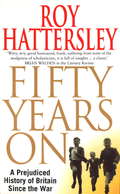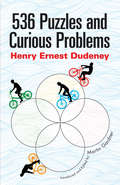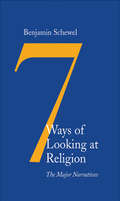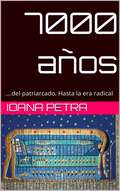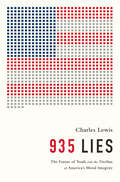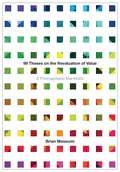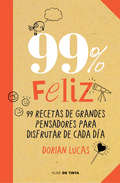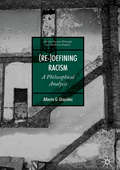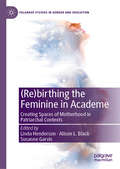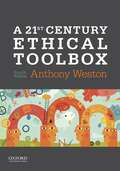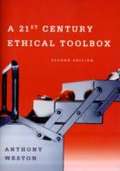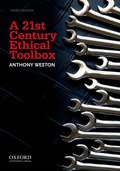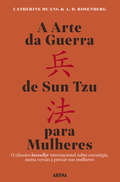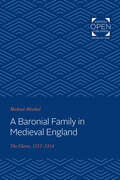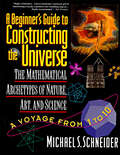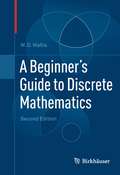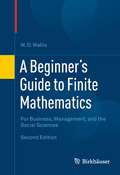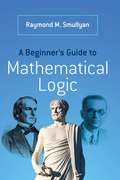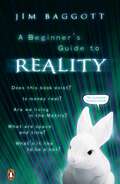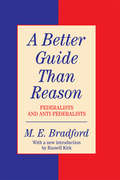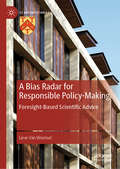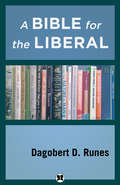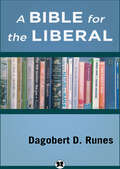- Table View
- List View
50 Years On: A Prejudiced History of Britain Since the War
by Roy HattersleyIn FIFTY YEARS ON, Roy Hattersley explores and explains the events which have shaped modern Britain. Combining acute analysis of domestic politics with a brilliant eye for the bigger picture, his 'prejudiced history' takes the reader from the high hopes of 1945 to the cynicism of end-of century Britain. Roy Hattersley focuses his attention on two particular features of post-war Britain: the perpetuation of an education system which fails to meet the needs of the whole country, and our stubborn refusal to accept that the United Kingdom is a medium-sized European nation which can only increase its power and prosperity by real integration within the European union. FIFTY YEARS ON is essential reading for anyone seeking to understand the forces that have shaped us.
50 Years On: A Prejudiced History of Britain Since the War
by Roy HattersleyIn FIFTY YEARS ON, Roy Hattersley explores and explains the events which have shaped modern Britain. Combining acute analysis of domestic politics with a brilliant eye for the bigger picture, his 'prejudiced history' takes the reader from the high hopes of 1945 to the cynicism of end-of century Britain. Roy Hattersley focuses his attention on two particular features of post-war Britain: the perpetuation of an education system which fails to meet the needs of the whole country, and our stubborn refusal to accept that the United Kingdom is a medium-sized European nation which can only increase its power and prosperity by real integration within the European union. FIFTY YEARS ON is essential reading for anyone seeking to understand the forces that have shaped us.
501 Practical Ways to Teach Your Children Values
by Bobbie ReedHow to teach your children values from a Biblical perspective
536 Puzzles and Curious Problems
by Martin Gardner Henry E. DudeneyFor two decades, self-taught mathematician Henry E. Dudeney wrote a puzzle page, "Perplexities," for The Strand Magazine. Martin Gardner, longtime editor of Scientific American's mathematical games column, hailed Dudeney as "England's greatest maker of puzzles," unsurpassed in the quantity and quality of his inventions. This compilation of Dudeney's long-inaccessible challenges attests to the puzzle-maker's gift for creating witty and compelling conundrums. This treasury of intriguing puzzles begins with a selection of arithmetical and algebraical problems, including challenges involving money, time, speed, and distance. Geometrical problems follow, along with combinatorial and topological problems that feature magic squares and stars, route and network puzzles, and map coloring puzzles. The collection concludes with a series of game, domino, match, and unclassified puzzles. Solutions for all 536 problems are included, and charming drawings enliven the book.
7 Ways of Looking at Religion: The Major Narratives
by Benjamin SchewelAn ambitious scholar&’s lucid analysis of religion&’s shifting place in the modern world.Western intellectuals have long theorized that religion would undergo a process of marginalization and decline as the forces of modernity advanced. Yet recent events have disrupted this seductively straightforward story. As a result, while religion has somehow evolved from its tribal beginnings up through modernity and into the current global age, there is no consensus about what kind of narrative of religious change we should alternatively tell.Seeking clarity, Benjamin Schewel organizes and evaluates the prevalent narratives of religious history that scholars have deployed over the past century and are advancing today. He argues that contemporary scholarly discourse on religion can be categorized according to seven central narratives: subtraction, renewal, transsecular, postnaturalist, construct, perennial, and developmental. Examining the basic logic, insights, and limitations of each of these narratives, Schewel ranges from Martin Heidegger to Muhammad Iqbal, from Daniel Dennett to Charles Taylor, to offer an incisive, broad, and original perspective on religion in the modern world.&“The book should be a widely read guide to the ideas that structure many of the debates scholars are having today about the meaning of postsecularism and future of religion.&” —Geoffrey Cameron, Review of Faith and International Affairs"What is the future of religion and how should we narrate its past? For all readers interested in these questions, this balanced and concise book is a must read.&” —Hans Joas, Humboldt University, Berlin, and University of Chicago
7000 años de Patriarcado: ... hasta la era radical (7000 Years #1)
by Ioana Petra"7000 años..." es una selección de análisis feministas radicales originales, escritos de la manera más accesible posible, con la menor cantidad de referencias bibliográficas posibles. La sencillez de la exposición —un desafío para la autora que proviene del mundo académico científico— no debe tener nada que ver con la sencillez de las ideas y las conclusiones a las que llegan los análisis a partir de ideas biológicas originales. Este libro parte de un proyecto concebido como capaz de llevar el feminismo radical más lejos, no sólo planteando nuevas críticas al patriarcado (visto también desde otros ángulos), sino también nuevas reivindicaciones feministas radicales. Y, por último, pero no menos importante, quiere iniciar la fundación de una nueva cultura feminista centrada en las mujeres, en sus deseos, y lo más libre posible de la contaminación patriarcal. Quería hacer de este libro un ejercicio de creatividad, libre pensamiento, valentía. Espero que las cosas también sean iguales para las lectoras y lectores.
935 Lies: The Future of Truth and the Decline of America's Moral Integrity
by Charles LewisFacts are and must be the coin of the realm in a democracy, for government OC of the people, by the people and for the people, OCO requires and assumes to some extent an informed citizenry. Unfortunately, for citizens in the United States and throughout the world, distinguishing between fact and fiction has always been a formidable challenge, often with real life and death consequences. But now it is more difficult and confusing than ever. The Internet Age makes comment indistinguishable from fact, and erodes authority. It is liberating but annihilating at the same time. For those wielding power, whether in the private or the public sector, the increasingly sophisticated control of information is regarded as utterly essential to achieving success. Internal information is severely limited, including calendars, memoranda, phone logs and emails. History is sculpted by its absence. Often those in power strictly control the flow of information, corroding and corrupting its content, of course, using newspapers, radio, television and other mass means of communication to carefully consolidate their authority and cover their crimes in a thick veneer of fervent racialism or nationalism. And always with the specter of some kind of imminent public threat, what Hannah Arendt called OCyobjective enemies. OCOOCO An epiphanic, public comment about the Bush OC war on terrorOCO years was made by an unidentified White House official revealing how information is managed and how the news media and the public itself are regarded by those in power: OC You journalists live] OC in what we call the reality-based community. But] thatOCOs not the way the world really works anymore. WeOCOre an empire now, and when we act, we create our own reality . . . weOCOre historyOCOs actors . . . and you, all of you, will be left to just study what we do. OCO And yet, as aggressive as the Republican Bush administration was in attempting to define reality, the subsequent, Democratic Obama administration may be more so. Into the battle for truth steps Charles Lewis, a pioneer of journalistic objectivity. His book looks at the various ways in which truth can be manipulated and distorted by governments, corporations, even lone individuals. He shows how truth is often distorted or diminished by delay: truth "in time" can save terrible erroneous choices. In part a history of communication in America, a cri de coeur for the principles and practice of objective reporting, and a journey into several notably labyrinths of deception, "935 Lies" is a valorous search for honesty in an age of casual, sometimes malevolent distortion of the facts.
99 Theses on the Revaluation of Value: A Postcapitalist Manifesto
by Brian MassumiA speculative exploration of value, emphasizing practical experimentation in its future forms How can we begin to envision a postcapitalist economy without first engineering a radically new concept of value? And with a renewed sense of how and what we collectively value, what would the transition to new social forms look like? According to Brian Massumi, it is time to reclaim value from the capitalist market and the neoliberal reduction of life to &“human capital.&” It is time to occupy surplus-value for a postcapitalist future.99 Theses on the Revaluation of Value is both a theoretical and practical manifesto. Massumi reexamines ideas about money, exchange, and finance, with special attention to how what we value in experience for quality is economically translated into quantity. He proposes new conceptual tools for understanding value in directly qualitative terms, speculating on how this revaluation of value might practically form the basis of an alter-economy. A promising path, he suggests, might involve emerging blockchain technologies beyond bitcoin. But these must be uprooted from their libertarian origins and redesigned to serve not individual choice but collective creativity, not calculations of self-interest but collaborative speculations on the future to be shared. It is necessary to grasp the specificity of our contemporary neoliberal condition and the ultimately destructive forms of power it mobilizes to better resist their claim on the future.99 Theses on the Revaluation of Value is written to galvanize a radical redefinition of value for a livable postcapitalist future.
99% feliz: 99 recetas de grandes pensadores para disfrutar de cada día
by Dorian Lucas¿Cuál es el secreto de la felicidad? Los filósofos de Oriente y Occidente llevan miles de años buscando respuesta a las mismas cuestiones que nos preocupan hoy en día. ¿Cuál es el secreto de la felicidad? ¿Hay algún atajo hacia el éxito? ¿Cómo podemos distinguir el amor verdadero? ¿Qué hacer cuando todo se pone en contra nuestra? De Platón a Buda, pasando por Nietzsche, Simone de Beauvoir, Schopenhauer o Freud, este libro fresco y divertido, acompañado de cuidadas ilustraciones, reúne las mejores máximas de los grandes genios de la humanidad sobre felicidad, amor, libertad, amistad..., en forma de inteligentes ideas para afrontar, con filosofía, cualquier duda o desafío que te plantee el día a día.
: A Philosophical Analysis (African American Philosophy and the African Diaspora)
by Alberto G. UrquidezWhat is racism? is a timely question that is hotly contested in the philosophy of race. Yet disagreement about racism’s nature does not begin in philosophy, but in the sociopolitical domain. Alberto G. Urquidez argues that philosophers of race have failed to pay sufficient attention to the practical considerations that prompt the question “What is racism?” Most theorists assume that “racism” signifies a language-independent phenomenon that needs to be “discovered” by the relevant science or “uncovered” by close scrutiny of everyday usage of this term. (Re-)Defining Racism challenges this metaphysical paradigm. Urquidez develops a Wittgenstein-inspired framework that illuminates the use of terms like “definition,” “meaning,” “explanation of meaning,” and “disagreement,” for the analysis of contested normative concepts. These elucidations reveal that providing a definition of “racism” amounts to recommending a form of moral representation—a rule for the correct use of “racism.” As definitional recommendations must be justified on pragmatic grounds, Urquidez takes as a starting point for justification the interests of racism's historical victims.
: Creating Spaces of Motherhood in Patriarchal Contexts (Palgrave Studies in Gender and Education)
by Susanne Garvis Alison L. Black Linda HendersonThis book engages expansively with the concept of motherhood in academia, to offer insights into re-imagining a more responsive higher education. Written collaboratively as international, interdisciplinary and intergenerational collectives, the editors and contributors use various ways of understanding ‘motherhood’ to draw attention to – and disrupt – the masculine structures currently defining women’s lives and work in the academy. Shifting the focus from patriarchal understandings of academe, the narratives embrace and champion feminist and feminine scholarship. The book invites the reader to question what can be conceived when motherhood is imagined more expansively, through lenses traditionally silenced or made invisible. This pioneering volume will be of interest and value to feminist scholars, as well as those interested in disrupting patriarchal academic structures.
A 21st Century Ethical Toolbox
by Anthony WestonThoroughly optimistic, this book invites students to approach ethical issues with a reconstructive intent--to make room for more and better options than the rigid "pro" and "con" positions that have developed around tough problems like abortion and our obligations to future generations and the Earth. Employing an accessible, consistently engaging writing style, Anthony Weston covers the skills that are vital to making real progress in ethics, including critical thinking, creative problem-solving, moral vision, and genuine dialogue. Provocative selections from a wide range of philosophers, essayists, activists, and students are interwoven with Weston's own discussions. The text is enhanced by extensive "Exercises and Notes" sections at the end of each chapter and new and expanded "Going Farther" sections between many chapters. Join instructors and students around the country who are using the experiential and applied activities inspired by this "toolbox" of skills to design interactive and collaborative ethics courses.
A 21st Century Ethical Toolbox (2nd Edition)
by Anthony WestonA 21st Century Ethical Toolbox offers a uniquely practical and hands-on introduction to ethics. Thoroughly optimistic, the book invites students to approach ethical issues with a reconstructive intent--to "break out of the box" in order to make room for more and better options than the rigid"pro" and "con" positions that have developed around tough problems like abortion and environmental ethics. In this book, ethics is treated not as an invitation to issue summary moral judgments or to construct and evaluate moral theories, but as an ongoing set of real-life challenges that call for multiple, integrated, and open-ended kinds of intelligence. Anthony Weston covers the skills that are vital to making real progress in ethics, including critical thinking, creative problem-solving, moral vision, mindful speech, and many more. Readers will find refreshing examples of real people andcommunities who have made progress in reframing and resolving ethical dilemmas by thinking and acting in constructive and innovative ways. Instructors can readily use the experiential and applied activities inspired by this "toolbox" of skills to design an interactive and collaborative ethics course, and students will find the resources and the encouragement to carry those skills into practice. A 21st Century Ethical Toolbox addresses a broad spectrum of compelling ethical issues, including abortion, sexual choices, what and how we eat, crime and punishment, fair trade, environmental justice, and many others. Provocative selections from a wide range of philosophers, essayists,community activists, and students are interwoven with Weston's own discussions. The text is enhanced by an extensive "Exercises and Notes" section at the end of each chapter and a detailed appendix that offers instructors advice on how to use this book in the classroom. New to the Second Edition: * A reorganized structure that covers a wider range of topics, grouped into four parts: Getting Started; Moral Values; Ethical Practice; and Making a Difference * A more diverse selection of sources that pays more attention to multicultural representation and religious ethics * New and additional readings from moral philosophers, first-rate writers, community activists, and college students, including Alice Walker, Ursula LeGuin, Bertrand Russell, Kwasi Wiredu, Aldo Leopold, and many others * A new chapter on "Mindful Speech" by Spoma Jovanovic, a leading figure in Communication Ethics * An all-new Part IV on how to make a real ethical difference * Ten review questions in each chapter that can also be used as test questions * A second appendix, "Experiential Teaching in Ethics," by Sharon Hartline of Radford University.
A 21st Century Ethical Toolbox (Third Edition)
by Anthony WestonThoroughly optimistic, A 21st Century Ethical Toolbox, Third Edition, invites students to approach ethical issues with a reconstructive intent--to make room for more and better options than the rigid "pro" and "con" positions that have developed around tough problems like abortion and environmental ethics. Employing an accessible, consistently engaging writing style, Anthony Weston covers the skills that are vital to making real progress in ethics, including critical thinking, creative problem-solving, moral vision, genuine dialogue, and many more. Provocative selections from a wide range of philosophers, essayists, community activists, and students are interwoven with Weston's own discussions. The text is enhanced by extensive "Exercises and Notes" sections at the end of each chapter, new "Using Your Tools" sections after every two chapters, and a detailed guide for teachers as an appendix. Join instructors and students around the country who are using the experiential and applied activities inspired by this "toolbox" of skills to design interactive and collaborative ethics courses.
A Arte da Guerra de Sun Tzu para mulheres
by Arthur D. Rosenberg Catherine HuangO clássico bestseller internacional sobre estratégia, numa versão a pensar nas mulheres A suprema arte da guerra é derrotar o inimigo sem lutar Seguindo os antigos ensinamentos chineses d'A Arte da Guerra, vai descobrir como usar as competências naturais para encontrar o seu caminho na vida. Os ensinamentos de Sun Tzu, aqui adaptados para as mulheres, foram ajuda preciosa para estas encontrarem o caminho pacífico para o sucesso por meio de estratégias e abordagens que ficaram famosas no antigo texto chinês: A arte da guerra. A sabedoria feminina, ou o bom senso, trata de evitar confrontos desnecessários, conservar energia para as coisas que importam e procurar um resultado em que todos saiam vencedores. E para as mulheres, como para Sun Tzu, o sucesso não vem simplesmente de saber o que fazer, mas de saber quem somos. A arte da guerra de Sun Tzu para mulheres vai ajudá-la a considerar o que deseja alcançar e porque deseja alcançá-lo. Cobrindo os princípios intemporais de Sun Tzu ponto a ponto, num tom simples e prático, mostra como pode encontrar os seus pontos fortes, enfrentar os seus pontos fracos, lidar com os obstáculos e forjar a sua própria e única identidade através da carreira e da vida pessoal. Seja qual for o caminho a seguir, este livro dar-lhe-á estratégias, tácticas e exemplos práticos daquilo que precisa para aumentar a sua probabilidade de sucesso - e desfrutar durante todo o processo. «Qualquer que seja o seu caminho e objectivos pessoais na vida, A arte da guerra de Sun Tzu para mulheres fornece estratégias eficazes, tácticas e exemplos práticos de que precisa para aumentar a sua probabilidade de alcançar o sucesso.»Midwest Book Review
A Baronial Family in Medieval England: The Clares, 1217-1314 (The Johns Hopkins University Studies in Historical and Political Science)
by Michael AltschulOriginally published in 1965. In A Baronial Family in Medieval England: The Clares, 1217–1314, Michael Altschul studies the Clare family during the thirteenth century. The Clares spearheaded the struggle to enforce Magna Carta in the Barons' War. Historians prior to Altschul tended to neglect the Clares' history given the scattered nature of the archives documenting their time as a politically influential and powerful family. This book unfolds chronologically, outlining the Clares' rise to preeminence and describing how they administered their estates and income.
A Beginner's Guide to Constructing the Universe: The Mathematical Archetypes of Nature, Art, and Science
by Michael S. SchneiderDiscover how mathematical sequences abound in our natural world in this definitive exploration of the geography of the cosmosYou need not be a philosopher or a botanist, and certainly not a mathematician, to enjoy the bounty of the world around us. But is there some sort of order, a pattern, to the things that we see in the sky, on the ground, at the beach? In A Beginner's Guide to Constructing the Universe, Michael Schneider, an education writer and computer consultant, combines science, philosophy, art, and common sense to reaffirm what the ancients observed: that a consistent language of geometric design underpins every level of the universe, from atoms to galaxies, cucumbers to cathedrals. Schneider also discusses numerical and geometric symbolism through the ages, and concepts such as periodic renewal and resonance. This book is an education in the world and everything we can't see within it.Contains numerous b&w photos and illustrations.
A Beginner's Guide to Discrete Mathematics
by W. D. WallisWallis's book on discrete mathematics is a resource for an introductory course in a subject fundamental to both mathematics and computer science, a course that is expected not only to cover certain specific topics but also to introduce students to important modes of thought specific to each discipline . . . Lower-division undergraduates through graduate students. --Choice reviews (Review of the First Edition) Very appropriately entitled as a 'beginner's guide', this textbook presents itself as the first exposure to discrete mathematics and rigorous proof for the mathematics or computer science student. --Zentralblatt Math (Review of the First Edition) This second edition of A Beginner's Guide to Discrete Mathematics presents a detailed guide to discrete mathematics and its relationship to other mathematical subjects including set theory, probability, cryptography, graph theory, and number theory. This textbook has a distinctly applied orientation and explores a variety of applications. Key Features of the second edition: * Includes a new chapter on the theory of voting as well as numerous new examples and exercises throughout the book * Introduces functions, vectors, matrices, number systems, scientific notations, and the representation of numbers in computers * Provides examples which then lead into easy practice problems throughout the text and full exercise at the end of each chapter * Full solutions for practice problems are provided at the end of the book This text is intended for undergraduates in mathematics and computer science, however, featured special topics and applications may also interest graduate students.
A Beginner's Guide to Finite Mathematics: For Business, Management, and the Social Sciences
by W. D. WallisThis second edition of A Beginner's Guide to Finite Mathematics takes a distinctly applied approach to finite mathematics at the freshman and sophomore level. Topics are presented sequentially: the book opens with a brief review of sets and numbers, followed by an introduction to data sets, histograms, means and medians. Counting techniques and the Binomial Theorem are covered, which provides the foundation for elementary probability theory; this, in turn, leads to basic statistics. This new edition includes chapters on game theory and financial mathematics. Requiring little mathematical background beyond high school algebra, the text will be especially useful for business and liberal arts majors.
A Beginner's Guide to Mathematical Logic
by Raymond M. SmullyanCombining stories of great writers and philosophers with quotations and riddles, this completely original text for first courses in mathematical logic examines problems related to proofs, propositional logic and first-order logic, undecidability, and other topics. 2013 edition.
A Beginner's Guide to Reality
by Jim BaggottA Beginner's Guide to Reality is an introduction to philosophy for people who don't read philosophy. Jim Baggott's sources range from Aristotle to The Matrix. He examines the major developments in Western philosophical thought on the nature of reality, at each of three levels - social, perceptual and physical. (Do money, colour, or photons exist?) The book systematically investigates these levels, peeling away the assumptions we make about those parts of reality that we take for granted.
A Better Guide Than Reason: Federalists and Anti-federalists (The Library of Conservative Thought)
by M.E. BradfordIn this seminal volume, M. E. Bradford defines the Old Whig political tradition in American thought, showing that the inheritance of the prescriptive anti-federalists still lives. For Bradford, important elements in our heritage from the American Revolution have been systematically hidden from our view by anachronistic and partisan scholarship. He believes that other, more ideological components have been emphasized at the expense of the rest. Here he attempts to return us to our heritage.
A Bias Radar for Responsible Policy-Making: Foresight-Based Scientific Advice (St Antony's Series)
by Lieve Van WoenselPolicymakers prepare society for the future and this book provides a practical toolkit for preparing pro-active, future-proof scientific policy advice for them. It explains how to make scientific advisory strategies holistic. It also explains how and where biases, which interfere with the proper functioning of the entire science-policy ecosystem, arise and investigates how emotions and other biases affect the understanding and assessment of scientific evidence. The book advocates explorative foresight, systems thinking, interdisciplinarity, bias awareness and the anticipation of undesirable impacts in policy advising, and it offers practical guidance for them. Written in an accessible style, the book offers provocative reflections on how scientific policy advice should be sensitive to more than scientific evidence. It is both an appealing introductory text for everyone interested in science-based policy and a valuable guide for the experienced scientific adviser and policy scholar.
A Bible for the Liberal
by Dagobert D. RunesThis Bible is not a new book. It is, rather, a selection of the principles of ethics, taken from all biblical literature, including the HebrewBooks of Wisdom and TheApocrypha, without the usual mythological and ritualistic framework. Liberals of our time will find in this selection the essence of true Judaism and Christianity. The purpose of this anthology is to help those with critical, with even prejudicial eyes, to get a view of the majestic panorama that unfolds in the writings of the great Hebrew and Christian Men of God. The believer, as well as the non-believer, will be able to find in this book the essential ethics of the great law-givers and prophets of biblical times.
A Bible for the Liberal
by Dagobert D. RunesThe ethical teachings of Judaism and Christianity are presented in distilled form in this concise volume of Biblical writings. A Bible for the Liberal is not a new book. It is, rather, a selection of the principles of ethics, taken from all biblical literature, including the Hebrew Books of Wisdom and The Apocrypha, without the usual mythological and ritualistic framework. In these selections, philosopher Dagobert D. Runes presents what he calls &“the essence of true Judaism and Christianity.&” The believer, as well as the non-believer, will be able to find in this book the essential ethics of the great law-givers and prophets of biblical times.
